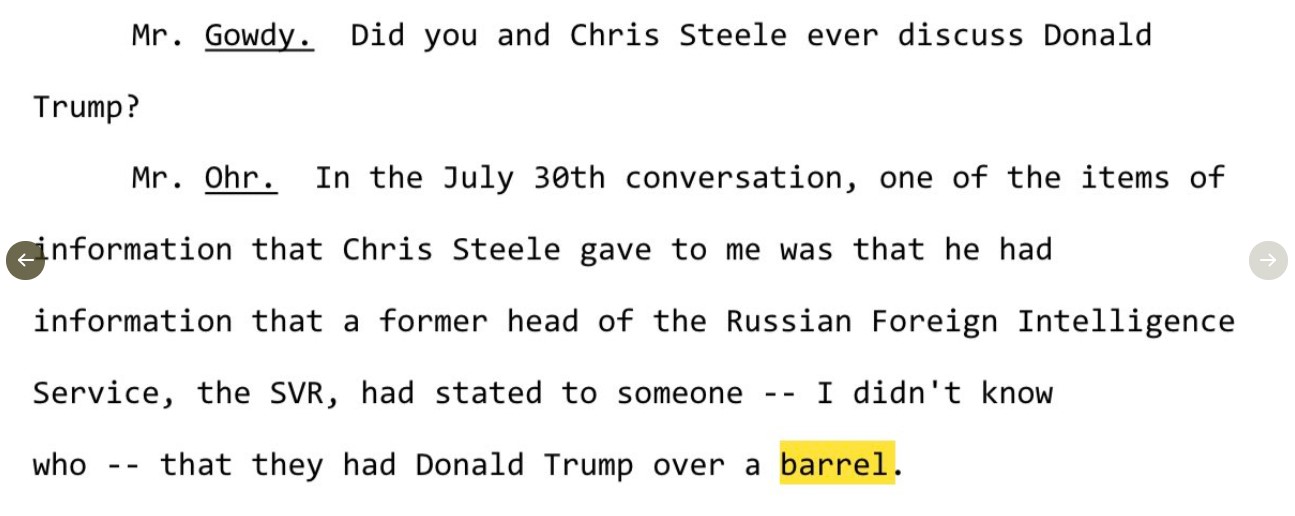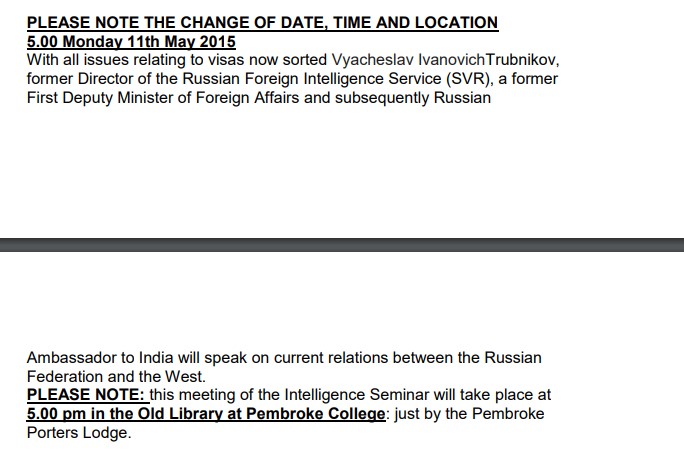Grassley Letter Asks Whether Taxpayers Paid Russian Agent To Help Start The Collusion Hoax
Did Stefan Halper attempt to recruit Trump campaign officials as sources? And did he have the FBI (or another agency’s) green light to do so? Grassley’s letter raises these questions, and more.
On Wednesday, Sen. Chuck Grassley’s office released a letter he penned to James Baker, the director of the Office of Net Assessments for the Department of Defense. Grassley’s letter ostensibly concerned fiscal oversight, but the details revealed by the finance committee chair raise new concerns about FBI confidential human source Stefan Halper.
Grassley’s letter began with a recap of his previous record requests, noting that in July 2019, the chair had requested “all records related to Professor [Stefan] Halper’s contracts with DoD.” Grassley then highlighted several revelations discovered during the finance committee chair’s review of those documents, including various weaknesses in Halper’s various proposals.
But it was Grassley’s discussion of a September 2015 ONA contract that proves the most significant:
In another contract, awarded in September 2015, Professor Halper lists former Deputy Foreign Minister for Russia, Vyacheslav Trubnikov, as a consultant and advisor to a paper delivered to ONA. Trubnikov is a known Russian intelligence officer, who was listed by Christopher Steele as a source in the now-debunked Steele dossier, which was used as a predicate to obtain a Foreign Intelligence Surveillance Act (FISA) warrant to surveil Trump Campaign adviser Cater Page. It is unclear from the contracting officer file whether Professor Halper paid Trubnikov for his assistance in gathering information for this paper, or in what capacity Professor Halper interacted with Trubnikov during the course of performing work for this contract. Further, reports indicate that Halper offered George Papadopoulos $3,000 for assistance in completing an energy study and met Carter Page at a Cambridge conference. Given Professor Halper’s intelligence connections and government funding, it is reasonable to ask whether he used any taxpayer money in his attempt to recruit Trump campaign officials as sources.
This paragraph raises several questions and concerns, but initially, one wonders what prompted Grassley to ask whether Halper used government funding “in his attempt to recruit Trump campaign officials as sources.” The IG report indicated that Halper served as a confidential human source for the FBI and that Halper was tasked with targeting Page and Papadopoulos, but also concluded that the Crossfire Hurricane team had not attempted to place a source within the Trump campaign.
But Grassley’s language suggests that Halper had sought to “recruit Trump campaign officials as sources.” Did he? Did Halper attempt to recruit Trump campaign officials as sources and if so, whom? And did he have the FBI (or another agency’s) green light to do so? Grassley’s letter raises these questions.
The revelation that Halper listed former Deputy Foreign Minister for Russia Vyacheslav Trubnikov “as a consultant and advisor to a paper delivered to ONA” raises even more questions. A preliminary question concerns Halper’s relationship with Trubnikov and whether the FBI knew of Halper’s connection to the former Russian intelligence agent, and whether Halper’s “Delta” file—the database “FBI agents use to record their interactions with, and information received from” confidential human sources (CHSs)—detailed the extent of that relationship.
One of the many deficiencies the IG detailed in its 400-plus page report addressed a similar issue concerning Steele. The IG explained that it “found instances where information we deemed significant about Steele was not included in his Delta file, and therefore was not available” for a confidential human source validation review. Among other facts omitted from the Delta file was “the FBI Transnational Organized Crime Intelligence Unit’s concerns about the number of contacts that Steele purportedly had with Russian oligarchs.” Those concerns would apply equally to Halper’s contacts with Russian intelligence agents, such as Trubnikov.

But Halper’s contacts with Trubnikov trigger a more significant question: Was Halper a sub-source for the Steele’s dossier relaying supposed intel from Trubnikov to Steele’s primary sub-source?
We know Steele told the State Department’s Kathleen Kavalec that one of his sources included Trubnikov, and Grassley noted in his letter that Steele had listed Trubnikov “as a source in the now-debunked Steele dossier.” Additionally, in his July 30, 2016, conversation with DOJ attorney Bruce Ohr, Steele claimed “that he had information that a former head of the Russian Foreign Intelligence Service, the SVR, had stated to someone—I didn’t know who—that they had Donald Trump over a barrel.”
While Ohr didn’t name Trubnikov as Steele’s supposed source, “Trubnikov ranRussia’s SVR (the external intelligence service, analogous to our CIA) before Putin came to power,” indicating Steele meant Trubnikov.
Now, of course, Steele could have invented it all. But if he didn’t, then someone passed on Trubnikov’s supposed intel to Steele. We know this because the IG report concluded “that neither Steele nor the Primary Sub-source had direct access to the information being reported.” Instead, Steele received his “intel” from a primary sub-source and that the “primary sub-source used a network of sub-sources to gather the information that was relayed to Steele.”
So, who had access to Trubnikov? Halper did: As Grassley’s letter reveals, Halper listed Trubnikov as “a consultant and advisor to a paper delivered to ONA,” under the September 2015 contract.
But that was not Halper’s only connection to Trubnikov. As Svetlana Lokhova, the Russian-born British academic who is suing Halper for defamation, told The Federalist, Trubnikov twice spoke at seminars at the University of Cambridge—seminars that listed Halper as a “conveyor,” along with other U.K. intelligence-connected individuals, such as Christopher Andrew and Sir Richard Dearlove.
The online program of the May 2015 intelligence seminar lists Trubnikov as the May 11, 2015 speaker on “current relations between the Russian Federation and the West.” The program from the intelligence seminar that ran three years earlier likewise identified Trubnikov as a guest speaker, then addressing “the challenges faced while directing the Foreign Intelligence Service, his tenure as Ambassador to India, President Putin and the likely course of Russia’s relations with Britain and the US.”

That Trubnikov’s connection to Cambridge and Halper dates back to 2012 raises further flags because Trubnikov has been pegged for some time as either source A or source B (or both?) in the Steele dossier. And those sources purportedly claimed that “Russian authorities have been cultivating and supporting” Trump “for at least 5 years.”

Could it be Halper? Or maybe Dearlove or Andrew or another organizer of the Cambridge “intelligence seminar?”
We don’t know. But does the IG?
The IG reported that the FBI was able to determine the identity of some sub-sources, and that “the FBI determined it was plausible that at least some of the sub-sources had access to intelligence pertinent to events described in Steele’s election reporting.” The Cambridge seminars provided such access to Trubnikov, making it plausible that a sub-source involved in the seminars had “access to intelligence,” described by Steele.
So, was it there that Trubnikov supposedly spilled the beans about Trump? If so, since we know the dossier’s claims that Trump colluded with Russia are false, Trubnikov played the Cambridge team, feeding them Russia disinformation. And then someone passed that “intel” on to the Clinton-funded Steele, who put it in his dossier which the Obama administration then used to illegally spy on Carter Page and the Trump campaign.
Or was Trubnikov never really a source? Did someone with a plausible connection to Trubnikov invent the “intel” and feed it to Steele? If so, who? And did they act alone? Here, the title of another Cambridge “intelligence seminar” session suggests an answer: “The Secret Special Relationship: The UK/USA Intelligence Alliance.”
But Americans want more than suggestions—we want the truth. And we are still a long way from finding out the full unfiltered truth behind the targeting of Trump.





Post a Comment